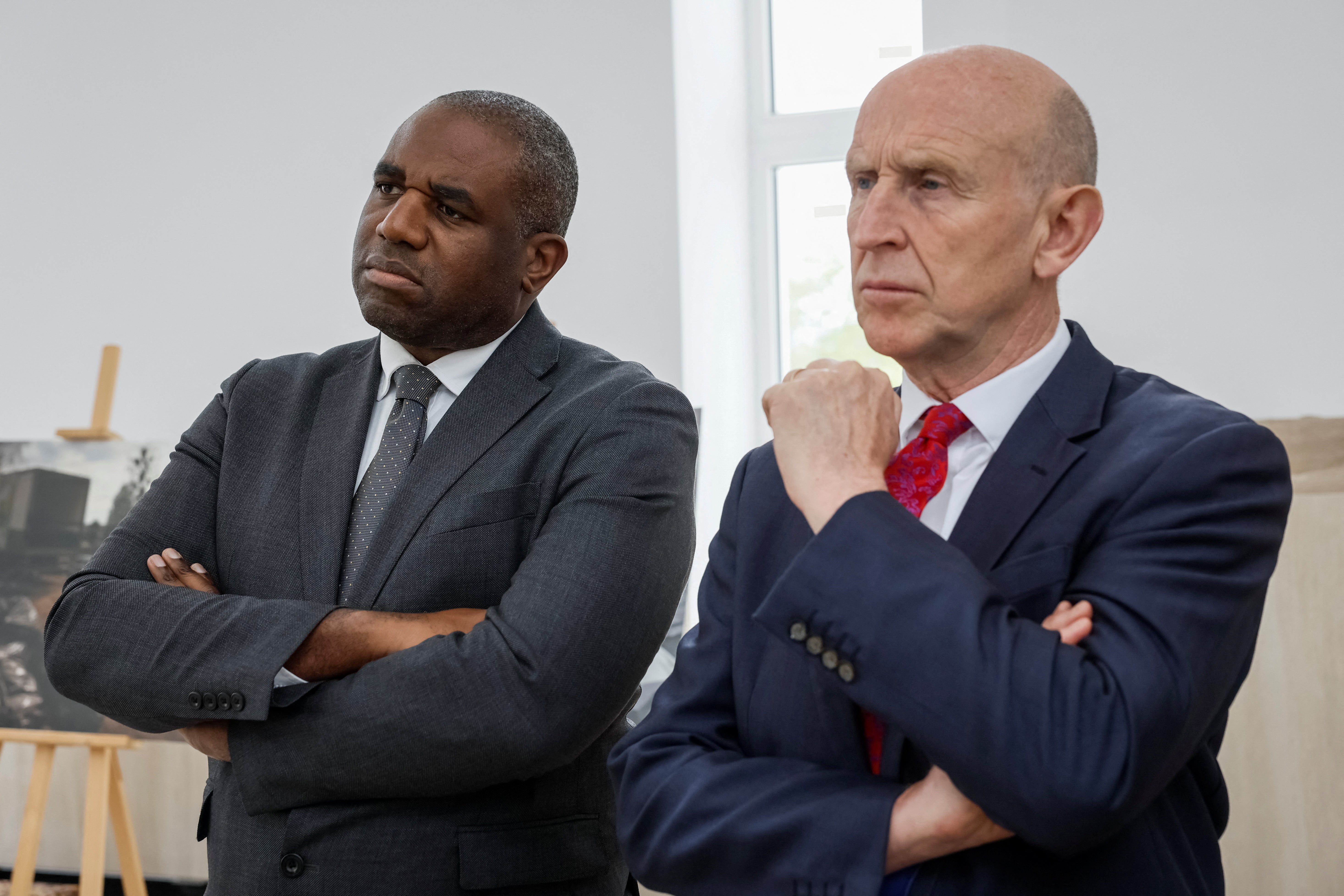Labour’s handbrake turn on defence makes them more hardline than the Tories
Keir Starmer’s shadow foreign secretary voted against Trident, but now wants us believe that he is more pro-nuclear and pro-Nato than Rishi Sunak, writes John Rentoul


They got the photos they came for. David Lammy and John Healey are not yet household names, but they looked the part as shadow foreign secretary and shadow defence secretary, shaking hands in Kyiv with Rustem Umerov, the Ukrainian defence minister, who was in military clothes.
Their message was simple: “A change in government in the UK would mean no change in our military, diplomatic, financial and political support to Ukraine.”
It is all part of Project Reassurance, convincing British voters that they will be safe with a Labour government. The Kyiv trip was a direct reply to Rishi Sunak, delivering a speech in London at about the same time on Monday, after which the prime minister explicitly claimed that Britain would be “less safe” under Keir Starmer.
Labour is competing toe-to-toe with the Tories to be more pro-Nato, more trusted to maintain the UK’s nuclear weapons and committed to spending more on defence. Labour was first to commit itself to raising defence spending to 2.5 per cent of national income, although Sunak leapfrogged Starmer in this game of muscular maths last month by promising to hit the target by 2030 – Labour has yet to set a date.
John Healey, Labour’s shadow defence secretary, has always been a resolute supporter of Nato and an advocate of Britain’s nuclear deterrent. But David Lammy, the shadow foreign secretary, has undergone a remarkable conversion. He voted against Trident in 2016, a year after he nominated Jeremy Corbyn for the Labour leadership.
He is the embodiment of the Labour Party’s journey from the anti-Nato quasi-pacifism of Corbyn to the “ironclad” pro-nuclear stance of late-period Starmer. Starmer, himself, has changed his views, but he never voted to get rid of Britain’s nuclear weapons, and he nominated Andy Burnham and Owen Smith for the leadership against Corbyn in 2015 and 2016.
Lammy, on the other hand, made a passionate speech in the House of Commons eight years ago, saying that, “as a Christian”, he thought “the idea of loving thy neighbour and protecting our world for future generations simply cannot hold if we have stockpiles of [nuclear] weapons”. He was against Trident on principle: “I cannot with a clear conscience vote for what is effectively a blank cheque for nuclear weapons.” And he was against it on practical grounds, saying nuclear weapons were “useless as a deterrent”, and asking: “Why do we need to have an independent programme at such a huge cost?”
It might be thought that it would be difficult to reverse out of such an emphatic position, but Lammy has been a cheerful part of Starmer’s decontamination operation. In September, Lammy wrote a joint article with Healey declaring that, “with Keir Starmer, our commitment to Nato and the UK’s nuclear deterrent – maintained on behalf of Nato allies – is unshakeable”.
Most opinion polls have for some time found that more voters trust Labour than the Conservatives on defence. Much of the explanation is simply that the Tories are so unpopular, but Keir Starmer and his shadow ministers have also worked hard to pose as tough on national security.
A lot of this is visual: the union flag in Starmer’s office-based videos, the photos of him and Healey in camouflage jackets with Nato troops on an exercise in Finland in December; and now Lammy and Healey in Kyiv.
Lammy has proved himself to be a remarkably flexible politician, and is one of the best speakers in the shadow cabinet. He has even impressed observers with the strength and depth of his connections to both Joe Biden and Donald Trump – in effect hedging Labour’s bets on the result of the US election. Despite having attacked Trump as a “racist Ku Klux Klan sympathiser” in the past, Lammy has defended Trump recently and said that his comments about Europe’s unwillingness to commit to Nato spending were “misunderstood”.
But in government, it matters what someone actually believes, which is why there is persistent speculation at Westminster that Lammy will be moved to a job unrelated to national security if Starmer wins. There are suggestions that David Miliband, who was foreign secretary under Gordon Brown, could be brought back – through the House of Lords if necessary, as David Cameron was. Although it might make more sense to appoint Douglas Alexander, who was international development secretary in the last Labour government, and who is expected to return to the Commons as MP for East Lothian.
Lammy may have got the photos he wanted from his trip to Ukraine, but if Starmer really is as ruthless as his admirers say he is, will he move the shadow foreign secretary to a domestic department after the election?
Join our commenting forum
Join thought-provoking conversations, follow other Independent readers and see their replies
Comments